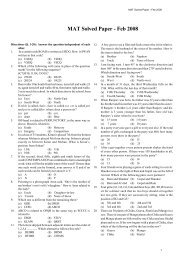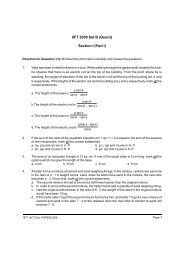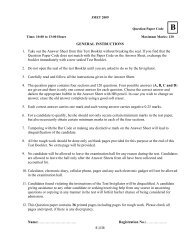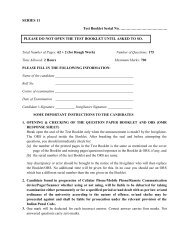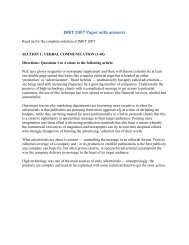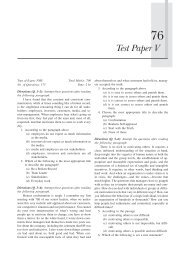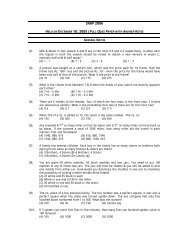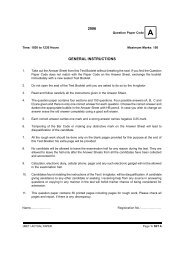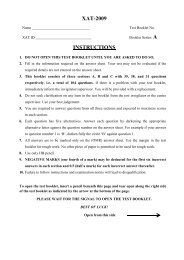PREVIOUS FMS QUESTION PAPER
PREVIOUS FMS QUESTION PAPER
PREVIOUS FMS QUESTION PAPER
Create successful ePaper yourself
Turn your PDF publications into a flip-book with our unique Google optimized e-Paper software.
indefinitely many considerations that may be appealed<br />
to in the original position and each alternative<br />
conception of justice is favoured by some consideration<br />
and disfavoured by others’, and also that ‘the balance of<br />
reasons itself rests on judgment, though judgment<br />
informed and guided by reasoning’. When Rawls goes<br />
on to concede that ‘the ideal cannot be fully attained’,<br />
his reference is to his ideal theory of justice as fairness.<br />
However, there need not be anything particularly ‘nonideal’<br />
in a theory of justice that makes room for<br />
surviving disagreement and dissent on some issues,<br />
while focusing on many solid conclusions that would<br />
forcefully emerge from reasoned agreement on the<br />
demands of justice.<br />
What is clear, however, is that if Rawls’s second<br />
thoughts are really saying what they seem to be saying,<br />
then his earlier stage-by-stage theory of justice as<br />
fairness would have to be abandoned. If institutions<br />
have to be set up on the basis of a unique set of<br />
principles of justice emanating from the exercise of<br />
fairness, through the original position, then the absence<br />
of such a unique emergence cannot but hit at the very<br />
root of the theory. There is a real tension here within<br />
Rawls’s own reasoning over the years. He does not<br />
abandon, at least explicitly, his theory of justice as<br />
fairness, and yet he seems to accept that there are<br />
incurable problems in getting a unanimous agreement<br />
on one set of principles of justice in the original<br />
position, which cannot but have devastating<br />
implications for his theory of 'justice as fairness’. My<br />
own inclination is to think that Rawls’s original theory<br />
played a huge part in making us understand various<br />
aspects of the idea of justice, and even if that theory has<br />
to be abandoned– for which there is, I would argue, a<br />
strong case- a great deal of the enlightenment from<br />
Rawls’s pioneering contribution would remain and<br />
continue to enrich political philosophy. It is possible to<br />
be at once deeply appreciated and seriously critical of a<br />
theory, and nothing would make me happier than<br />
having Rawls’s own company, if that were to come, in<br />
this ‘dual’ assessment of the theory of justice as<br />
fairness.<br />
1. According to Rawls,<br />
(1) Principles of justice are the unanimous choice<br />
of a just society<br />
PP-02 2A.3<br />
<strong>FMS</strong> Dec 2010<br />
(2) Principles of justice are politically derived<br />
(3) Both the above<br />
(4) None of the above<br />
2. Which of the following best fits the title of the<br />
passage?<br />
(1) The Idea of Justice<br />
(2) Unbiased Principles<br />
(3) Justice as Fairness<br />
(4) The Basic Structure of Society<br />
3. Which of the following is NOT a correct statement?<br />
(1) Suitable principles need to be identified to<br />
determine the choice of just institutions<br />
(2) Just institutions are required for the basic<br />
structure of society<br />
(3) Rawls has identified specific principles of<br />
justice<br />
(4) The author of the passage is in agreement with<br />
the principles of justice identified by Rawls<br />
4. Which of the following is a correct statement?<br />
(1) Rawls argues that citizens of a society<br />
governed by principles of justice would affirm<br />
a sense of justice based on them<br />
(2) The author of the passage argues that citizens<br />
of a society governed by principles of justice<br />
would affirm a sense of justice based on them<br />
(3) Both Rawls and the author of the passage<br />
argue that citizens of a society governed by<br />
principles of justice would affirm a sense of<br />
justice based on them<br />
(4) Neither Rawls nor the author of the passage<br />
argues that citizens of a society governed by<br />
principles of justice would affirm a sense of<br />
justice based on them<br />
5. Which of the following is a correct statement?<br />
(1) The author of the passage argues that<br />
principles of justice are chosen by all in the<br />
original position<br />
(2) Rawls argues that principles of justice are<br />
chosen by all in the original position





